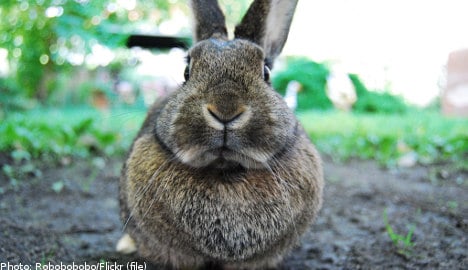”We need to find alternative sources of protein which don’t strain resources to the same extent,” said Carl-Gustaf Thulin, Director for the Center for Fish and Wildlife Research at the Swedish University of Agricultural Sciences (Sveriges lantbruksuniversitet) to the Sydsvenskan newspaper.
According to a report in daily Sydsvenskan, preliminary figures from the Swedish Board of Agriculture (Jordbruksverket) show that Swedes eat approximately 86 kilogrammes of meat every year, with chicken and beef being the favourites.
One explanation for the increase is the recent food trends that promote a diet high in protein but low in carbohydrates. The problem is just that the increase in meat consumption, especially in the case of beef, is taking its toll on the environment.
This, Thulin argues, could be alleviated should Swedes just get over their qualms about their furry friends and look at rabbits as food instead of as pets.
”I think that we are often getting away from the origins of the meat, from the proximity of life and death. We are ‘cuddlyfying’ the animals, we think they are cute and then we gorge on a fillet of chicken when someone has already done ‘the dirty work’. If we eat meat we ought to see the connection that animals are food, ” Thulin told Sydsvenskan.
According to Thulin, rabbits are the ”fish of the mammals”, eating roughage and transforming it efficiently to protein.
”In southern Europe this is a highly appreciated form of meat. Rabbit breeding is under-developed in Sweden and could be a great complement for farmers,” Thulin told the paper.
On March 22nd, Thulin will be holding a seminar called Rabbits, Rabbits, Rabbits (Kaniner, kaniner, kaniner) at the Royal Swedish Academy of Agriculture and Forestry (Kungliga skogs och lantbruksakademien) to bring the issue to the forefront of the discussion.


 Please whitelist us to continue reading.
Please whitelist us to continue reading.
Member comments